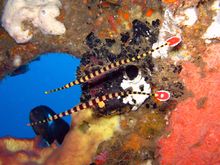- Banded pipefish
-
Banded pipefish 
Conservation status Scientific classification Kingdom: Animalia Phylum: Chordata Class: Actinopterygii Order: Gasterosteiformes Family: Syngnathidae Genus: Doryrhamphus Species: D. dactyliophorus Binomial name Doryrhamphus dactyliophorus
(Bleeker, 1853)Synonyms Dunckerocampus dactyliophorus
The banded pipefish or ringed pipefish (Doryrhamphus dactyliophorus) is a species of fish in the Syngnathidae (seahorses and pipefish) family.[1] It inhabits tide pools, lagoons, and outer reef slopes in tropical climates.[2] Its range includes Australia, Fiji, French Polynesia, Indonesia, Japan, Marshall Islands, New Caledonia, Northern Mariana Islands, Papua New Guinea, the Philippines, Samoa, the Solomon Islands, South Africa, and Taiwan.[3]
The banded pipefish has a straight, elongated body which reaches a maximum length of 19 cm (7.4 in).[2] It has fleshy streams coming back from its head, trailing sometimes metres behind the fish itself. These trails are thought to be mechanisms of camouflage for the pipefish whilst hiding in reeds.[4]
Similar to other seahorses and pipefish, the male banded pipefish is equipped with a specialised brood pouch, rather than the female.[5] The female will deposit her eggs in the male's pouch, where they will be developed. The male will later give birth.[6]
References
- ^ "Fish.gov.au". http://www.fish.gov.au/fishnames/fishnames.php?pid=1675. Retrieved 10 July 2008.
- ^ a b Froese, Rainer, and Daniel Pauly, eds. (2008). "Doryrhamphus dactyliophorus" in FishBase. 02 2008 version.
- ^ Vincent, A. 1996. Doryrhamphus dactyliophorus. 2006 IUCN Red List of Threatened Species. Downloaded on 4 August 2007.
- ^ Berghaus, Günter (2004). New Perspectives on Prehistoric Art. Greenwood Publishing Group. ISBN 0275978133.
- ^ Encyclopedia of the Aquatic World. Marshall Cavendish. 2004. ISBN 0761474188.
- ^ Blasiola, George C.; Matthew M. Vriends (2000). The Saltwater Aquarium Handbook. Barron's Educational Series. ISBN 0764112414.

This Syngnathiformes-related article is a stub. You can help Wikipedia by expanding it.

